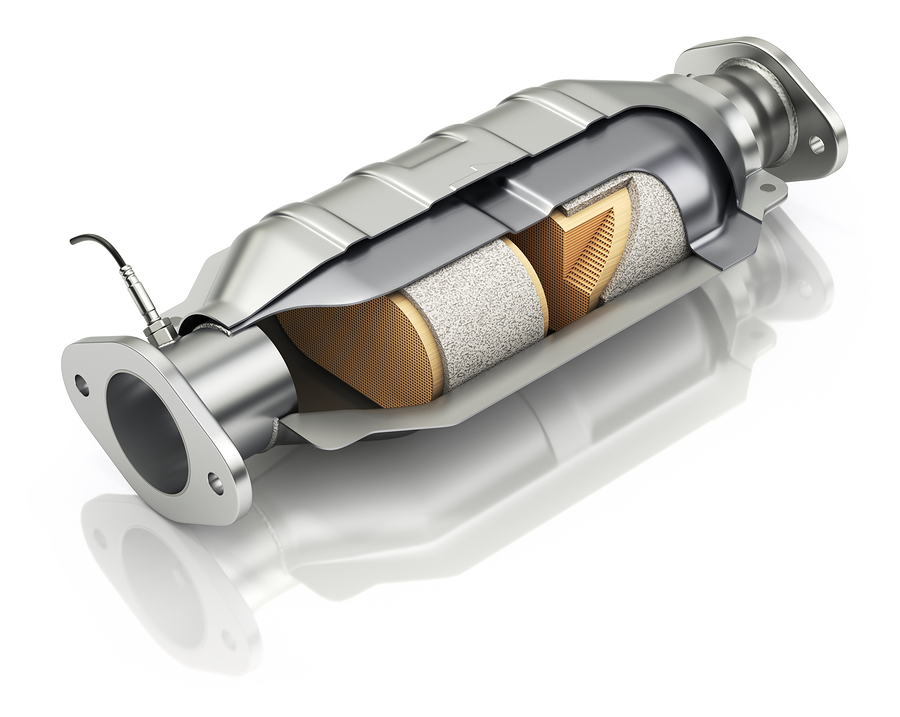DENVER (AP) — All Rebecca Hayes wanted were some bagels from Rosenberg’s.
But when got into her 2007 Prius on recently, the usual silence of an electric vehicle was replaced by what sounded like a Harley-Davidson.
“I came out in the morning. and pressed the `on’ button and it just roared,” Hayes said. “It scared the crap out of me.”
The Denver resident realized almost immediately that her catalytic converter had been stolen. The emissions-control device was torn out from underneath her car, and police say such thefts are surging in the Denver area and across the nation.
Denver has seen a 1,600% year-over-year increase in catalytic-converter thefts during the pandemic. In 2019, residents reported 15 thefts of catalytic converters, according to data from the Denver Police Department. In 2020, 257 were reported stolen. And just in January of this year, another 108 catalytic converters were reported stolen — nearly half of last year’s total.
The parts can be sold for a few hundred dollars apiece, but can cost vehicle owners more than $1,000 to replace, police said.
A similar surge happened during the 2008 recession, said Denver Urban Autocare service adviser Zach Bazylak. Now just as then, he said, people need money and thievery is their practice of choice.
Catalytic converters are made with three valuable metals: platinum, palladium and rhodium. When people steal the parts, they often sell them for scrap, Bazylak said.
Lakewood police Cmdr. Mike Greenwell, head of Colorado Auto Theft Prevention Authority’s Metropolitan Auto Theft Task Force, said the price for precious metals is “sky high,” adding that all metals are expensive right now, even aluminum.
Greenwell said he did not have figures on how many catalytic converters have been stolen metro-wide, and noted it’s hard to pinpoint the true number of such thefts because people don’t always report them.
“They know there isn’t much the police can do about it and they just need their vehicle fixed,” Greenwell said.
Police, though, still do encourage people to report thefts of the parts, which help reduce emissions that come out of a car’s exhaust.
“Catalytic converters are on every vehicle that’s purchased,” Bazylak said. “In Colorado, in order to register a vehicle, you have good catalytic converters that allow you to pass emissions.”
In 2018, Colorado adopted California-style emission vehicle standards to help reduce greenhouse gas output “by more than 26% by 2025,” according to an executive order by previous Colorado Gov. John Hickenlooper.
Catalytic converters help with this effort by converting over 90% of hydrocarbons, carbon monoxide and nitrogen oxides from the engine into less harmful carbon dioxide, nitrogen and water vapor.
Bazylak said thieves often steal from cars with working catalytic converters, but sell the piece as “junk,” as the parts cannot typically be placed back onto another car unless it’s be someone certified to do so.
“The brand new ones are more expensive because they have to meet certain requirements, whereas the used ones have been on cars for a long time,” Bazylak said. “Usually when they’re sold as a junk part, that’s just it, they’re junk.”
While the price for selling a catalytic converter is no more than $300 depending on size, the repair costs are significantly higher. A typical replacement is around $1,500, but it can range anywhere from $1,000 to $2,500 or more depending on the car.
“With 45 minutes of work, if I can get $300 that’s pretty good pay,” Greenwell said.
It’s because of that high replacement price that Hayes believes her 14-year-old car, which has 154,000 miles on it, to be totaled.
“It was really humbling I would say for that to happen and just realize how quickly something can completely change your life,” Hayes said. “I just parked on the same street I’ve been parking on for three years.”
It only takes thieves about five to 10 minutes to steal a catalytic converter if they have the right tools and enough space to get underneath the vehicle.
And if the owner does not have comprehensive coverage on their car, insurance will not cover repairs. Additionally, it may not be just that piece missing. Thieves could potentially do more damage.
However, it’s up to the individual if they choose to file a claim or not, said Carole Walker, executive director of the Rocky Mountain Insurance Association, which does not track the number of catalytic converter claims.
Hayes said it seems like a “free-for-all” on catalytic converters.
“I keep telling people, it’s because we have it so easy as Prius owners because they’re objectively fantastic cars and have very little mechanical issues, so this is just karma,” she said.
Was this article valuable?
Here are more articles you may enjoy.


 Judge Upholds $243M Verdict Against Tesla Over Fatal Autopilot Crash
Judge Upholds $243M Verdict Against Tesla Over Fatal Autopilot Crash  NYC Travel Snarled by Snow as Central Park Gets 15 Inches
NYC Travel Snarled by Snow as Central Park Gets 15 Inches  Red Flags Adjusters Should Look for in Truck Accident Claims Investigations
Red Flags Adjusters Should Look for in Truck Accident Claims Investigations  Explosive Wildfires Surge Through Oklahoma Panhandle and Kansas
Explosive Wildfires Surge Through Oklahoma Panhandle and Kansas 